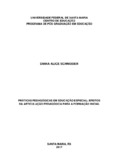| dc.creator | Schneider, Diana Alice | |
| dc.date.accessioned | 2018-10-04T19:34:07Z | |
| dc.date.available | 2018-10-04T19:34:07Z | |
| dc.date.issued | 2017-08-28 | |
| dc.identifier.uri | http://repositorio.ufsm.br/handle/1/14459 | |
| dc.description.abstract | From the moment of publication of the Nacional Policy of Special Education in the Perspective of the Inclusive Education (BRASIL, 2008), the students with disabilities, pervasive developmental disorder and the gifted ones started attending the regular school, therefore the educational services became responsible for the offer and organization of Special Education services. The presence of these students in regular schools challenges the pedagogical practices. That way, the collaborative education, the coordinated teaching work and other forms of articulation have become promising ways of establishing collaborative pedagogical practices among the Special Education and Regular Education teachers. The questions regarding the actions of collaborative education at PIBID/Special Education proposes discussions concerning the initial training in Special Education. So, the objective of this dissertation was to analyze the effects of the pedagogical articulation for the initial training regarding the Special egresses who participated in PIBID/Special Education at the Federal University of Santa Maria. Aiming at investigation how the formative process of the professionals in the area of Special Education, we have approached historical and political elements which surround the history of Special Education and the formative process in Special Education. The present research is inserted in a qualitative investigative approach. The semi structured interview was chosen as a technique to produce data and the analytical process took place based on Bardin (2011). The results are on the contributions of the actions in collaborative teaching at PIBID/Special Education for the enrichment of the initial formation and the reflection about the collaborative pedagogical practice in this field of work. From the results, we could identify that the initial resistance in sharing the classroom with a less experienced intern is one of the negative points which contributes in a way that the articulated action does not occur. The lack of time for planning also undermines this process. | eng |
| dc.description.sponsorship | Coordenação de Aperfeiçoamento de Pessoal de Nível Superior - CAPES | por |
| dc.language | por | por |
| dc.publisher | Universidade Federal de Santa Maria | por |
| dc.rights | Attribution-NonCommercial-NoDerivatives 4.0 International | * |
| dc.rights.uri | http://creativecommons.org/licenses/by-nc-nd/4.0/ | * |
| dc.subject | Educação especial | por |
| dc.subject | Formação inicial | por |
| dc.subject | Ensino colaborativo | por |
| dc.subject | Inclusão escolar | por |
| dc.subject | Special education | eng |
| dc.subject | Initial training | eng |
| dc.subject | Collaborative work | eng |
| dc.subject | School inclusion | eng |
| dc.title | Práticas pedagógicas em educação especial: articulação pedagógica para a formação inicial | por |
| dc.title.alternative | Pedagogical practices in special education: effects in the collabotive teaching for the initial training | eng |
| dc.type | Dissertação | por |
| dc.description.resumo | A partir da publicação da Política Nacional de Educação Especial na Perspectiva da Educação Inclusiva (BRASIL, 2008), os alunos com deficiências, transtornos globais do desenvolvimento e altas habilidades/superdotação passaram a frequentar a escola regular, cabendo aos sistemas de ensino a oferta e organização dos serviços da Educação Especial. A presença deste aluno no ensino comum lança grandes desafios às práticas pedagógicas. Dessa forma, o ensino colaborativo, o trabalho docente articulado e outras formas de articulação, têm se tornado meios promissores para a efetivação de práticas pedagógicas articuladas entre os professores da Educação Especial e da Educação Regular. A problematização acerca das ações do ensino colaborativo no âmbito do PIBID/Educação Especial propõe discussões quanto à formação inicial em Educação Especial. Desta forma, esta dissertação teve o objetivo de analisar os efeitos da articulação pedagógica para formação inicial dos egressos do curso de Licenciatura em Educação Especial que participaram do PIBID/Educação Especial da Universidade Federal de Santa Maria. Com a intenção de investigar como ocorreu o processo formativo dos profissionais da área da Educação Especial abordamos os elementos históricos e políticos que circundam a história da Educação Especial e o processo formativo em Educação Especial. A presente pesquisa se insere numa abordagem qualitativa de investigação. A entrevista semiestruturada foi escolhida como técnica de produção dos dados e o processo analítico deu-se com base na análise de conteúdo de Bardin (2011). Os resultados tecem sobre as contribuições das ações do ensino colaborativo no âmbito do PIBID/Educação Especial para o enriquecimento da formação inicial e da reflexão sobre a prática pedagógica colaborativa no campo de atuação. A partir dos resultados encontrados identificamos que a resistência inicial em dividir a sala de aula com um estagiário menos experiente é um dos pontos negativos que contribuem para que as ações articuladas não aconteçam. A falta de tempo para o planejamento também acaba prejudicando este processo. | por |
| dc.contributor.advisor1 | Bridi, Fabiane Romano de Souza | |
| dc.contributor.advisor1Lattes | http://lattes.cnpq.br/8914947342465602 | por |
| dc.contributor.referee1 | Baptista, Claudio Roberto | |
| dc.contributor.referee1Lattes | http://lattes.cnpq.br/3335193926784100 | por |
| dc.contributor.referee2 | Menezes, Eliana da Costa Pereira de | |
| dc.contributor.referee2Lattes | http://lattes.cnpq.br/5996369654576945 | por |
| dc.creator.Lattes | http://lattes.cnpq.br/2301232526403946 | por |
| dc.publisher.country | Brasil | por |
| dc.publisher.department | Educação | por |
| dc.publisher.initials | UFSM | por |
| dc.publisher.program | Programa de Pós-Graduação em Educação | por |
| dc.subject.cnpq | CNPQ::CIENCIAS HUMANAS::EDUCACAO | por |
| dc.publisher.unidade | Centro de Educação | por |



